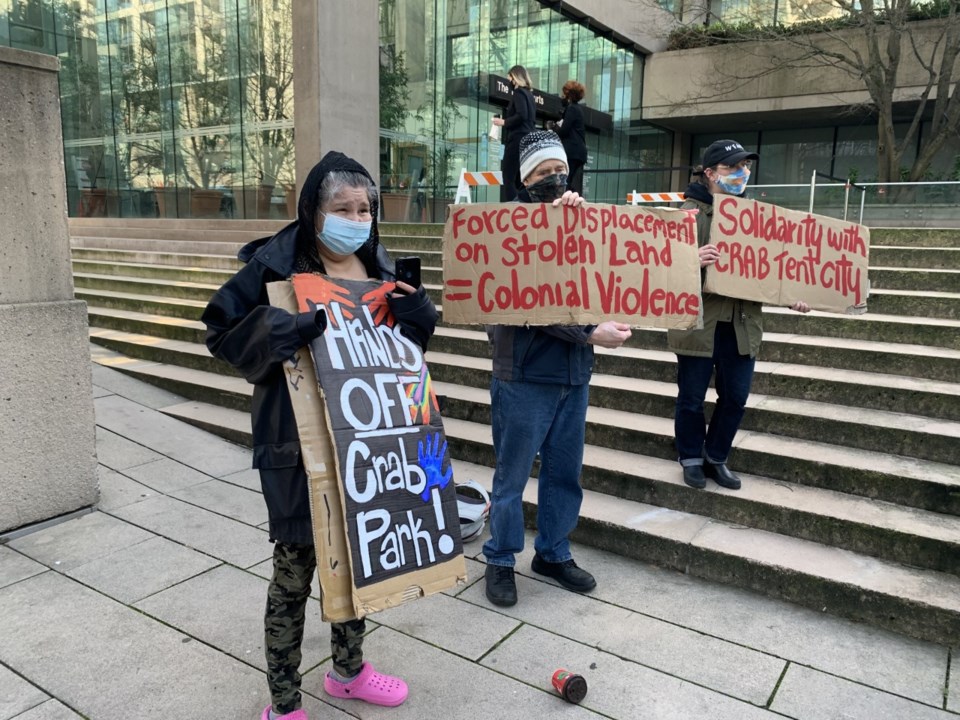A sufficient supply of shelter beds and a low-barrier way to access them could help reduce the number of homeless campers in Â鶹´«Ă˝Ół»parks, a B.C. Supreme Court judge heard Dec. 2.
“They don’t want to be sleeping in the park if there is suitable space available,” said encampment members’ lawyer Julia Riddle. “The lack of space is a problem.”
A hearing came as a result of the Â鶹´«Ă˝Ół»Park Board seeking a court injunction to remove several dozen tents at the park in Vancouver’s harbour.
And, it prompted about 40 people to gather on the courthouse steps as the case was heard inside.
“People have been camping there for six months and now a decision about whether they can shelter there is being decided by the colonial court system,” Crab Park encampment advocate Fiona York told the crowd.
She said lawyers are in court to resist the park board attempt to “get rid of” the campers.
Still, if the board gets its way, it would have the authority to dismantle the encampment by force. Campers refusing to depart could risk being arrested.
"Pursuing an injunction is not a step we take lightly and only pursued when all other avenues, such as enforcing bylaws and general manager orders, have been exhausted," spokesperson Jeannine Guérette said in an emailed statement ot Glacier Media. "With this said, our primary focus continues to be working with our partners to help support individuals experiencing homelessness in the park by connecting them with indoor spaces and other services."
Riddle appeared in court for encampment members Cory Kerri Bamberger and Jason Hebert to oppose the injunction request.
Riddle said the 211 line for people seeking shelters is inadequate, leaving people without computers or perhaps even phones trying to access online lists or having to make multiple calls to find beds for the night. She said the system assumes a level of mental functioning and energy to navigate it.
“This is a really hard process,” she said.
She relayed the tale of one man who slept on the street outside the Army & Navy shelter for days trying to get a bed.
“They don’t want to be sleeping in the park."
Riddle noted the COVID-19 pandemic has impacted the availability of shelter space.
The B.C. Civil Liberties Association (BCCLA) has called on the board to abandon seeking an injunction.
“We find this heavy-handed approach completely inhumane, unnecessary and contrary to the City of Vancouver’s commitment to decriminalizing poverty and supporting community-led safety initiatives,” the BCCLA said. “The latter includes not relying on the police to address matters of homelessness."
The BCCLA is urging the board, the city and B.C. Housing to ask Crab Park residents “what their needs are and what suitable low-barrier housing looks like to them.”
“Until such time that adequate housing options are available, this injunction, if granted, will violate the life, liberty and security of each person who calls Crab Park home.”
The board and the city agree "encampments do not represent an appropriate solution to the homelessness crisis and are deeply concerned about the safety and well-being of people experiencing homelessness across the city, including those experiencing homelessness and sleeping in Crab Park," Guérette said.
In 2020, Guérette said the board amended the parks control bylaw to allow for limited temporary overnight sheltering in parks.
"This is intended to provide support to people experiencing homelessness who have no other shelter option, but is not intended for people to set up structures in perpetuity," Guérette said.



